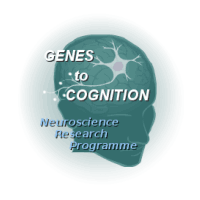An Integrative Neuroscience Program Linking Mouse Genes to Cognition and Disease
Seth G. N. Grant
(Taken from Behavioural Genetics in the Post Genomic Era, Edited by Robert Plomin, John C Defries, Ian W Craig and Peter McGuffin, American Psychological Association 2002. ISBN 1-55798-926-5) PDF version
- Introduction
- General Strategy & Outline
- Connecting the Molecular Mechanisms of Learning
- A Multilayer Organisation
- Layer 1: Identification of Genes Encoding Assemblies
- Layer 2: Genomics
- Layer 3: Functional Genomics - Experimental Neuroscience
- Layer 4: Informatics
- Structural Issues for a Large Multidisciplinary Program
- Conclusions
Introduction
The year 2001 marked the arrival of almost complete genome sequence for four organisms with nervous systems, which are also the subject of intense genetic studies: humans, mice, flies, and worms. In the same way that the advent of molecular biology or electrophysiology opened grand new insights into the function of the nervous system, the genome era offers yet another exciting platform for discovery. As with any new set of tools, we want to see them result in improved forms of health care and in the discovery of new biological processes. This chapter does not aim to predict either the future of this "postgenomic revolution" or all of the ways genome information can be applied to understanding behaviour. Here I outline a structure for a program of study, referred to as the Genes to Cognition program (G2C), which takes advantage of genomic information and combines it with a diverse set of methodologies. G2C is driven by studies in basic genetic organisms with the aim of using this information to understand mechanisms of behaviour and diseases of the human nervous system.
The potential of G2C is illustrated using the biology of learning and memory. Learning is a fundamental cognitive process that has been at the center of mechanistic studies of neural function for more than a century. In the past decade, studies in rodents have led to the identification of a large number of genes involved with learning, which far outstrips those known in any other area of cognitive science. This knowledge can now be applied to humans, where it is likely to be relevant to the pathologies of learning impairment in children, dementias, schizophrenia, and brain injury.
By the very nature of the quest to link genes with behaviour, it is necessary to construct a broadly integrative program that encompasses many distinct methods apart from genetics and psychology. These other areas include cell biology, electrophysiology, biochemistry, proteomics, microarrays, brain imaging, and more. This raises a new and fascinating problem of how to construct information networks that facilitate linking of these areas within a framework that not only provides rapid and simple access to information but also leads to the generation of new hypotheses and insights.
Despite the logic of constructing a framework linking large datasets ranging from molecular biology to psychology, and the inevitability of information accumulating and being organized in this manner, there needs to be a more purposeful drive to this goal. A potentially powerful focus of organization is based on the general recognition that biological functions are performed by sets of proteins (or genes) working together in pathways or as macromolecular machines (9476889; 10647941; 7817187). This logic can be adapted and applied to the study of behaviour Below are some guiding principles that underpin the G2C strategy:
- Basic aspects of behaviour and brain function are evolutionarily conserved.
- Core biochemical processes (e.g., signaling pathways and protein complexes) conduct these functions.
- Sets of genes encoding the core processes can be defined.
- Core processes are disrupted by mutations and produce phenotypes in humans.
- Multiple mutations or alleles cooperate to disrupt the core processes.
- Behaviors and some psychiatric diseases are polygenic; this nature may reflect multiple genes encoding core processes.
The following sections outline aspects of a general strategy for the assembly of a knowledge base that encompasses a biological spectrum from gene to behaviour
